Drive My Car director Hamaguchi: Oscar buzz is beyond imagination
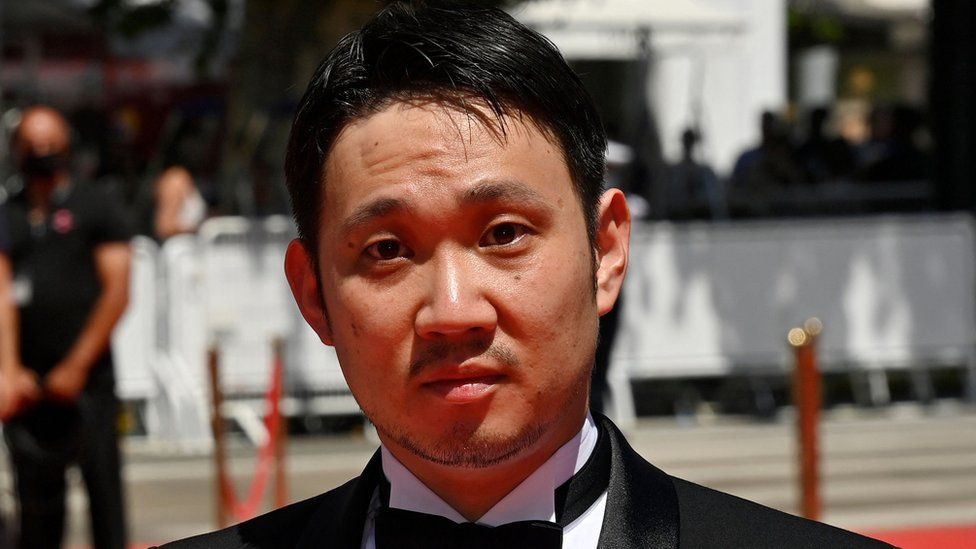 Image source, Getty Images
Image source, Getty ImagesRyusuke Hamaguchi is in uncharted waters.
A well-known and respected director on the festival circuit through films such as Happy Hour and Wheel of Fortune and Fantasy, his latest movie, Drive My Car, has catapulted him from the arthouse scene straight to the Hollywood hills.
As a searing Japanese-language film about an actor/theatre director navigating his way through complicated grief following the sudden death of his wife, early suggestions it would be a frontrunner on the Academy Awards' international film shortlist were considered a pretty safe bet.
But as this gentle, absorbing epic slowly began to gain traction, it was ultimately rewarded with not one but four Oscar nominations last month - best picture, best director, best adapted screenplay and (no prizes for guessing) best international film.
"I'm surprised to see my work nominated for Oscars," Hamaguchi tells the BBC in his typically understated way, via an interpreter. "And it's beyond my imagination, but getting interviews like this, I'm starting to realise this is real."
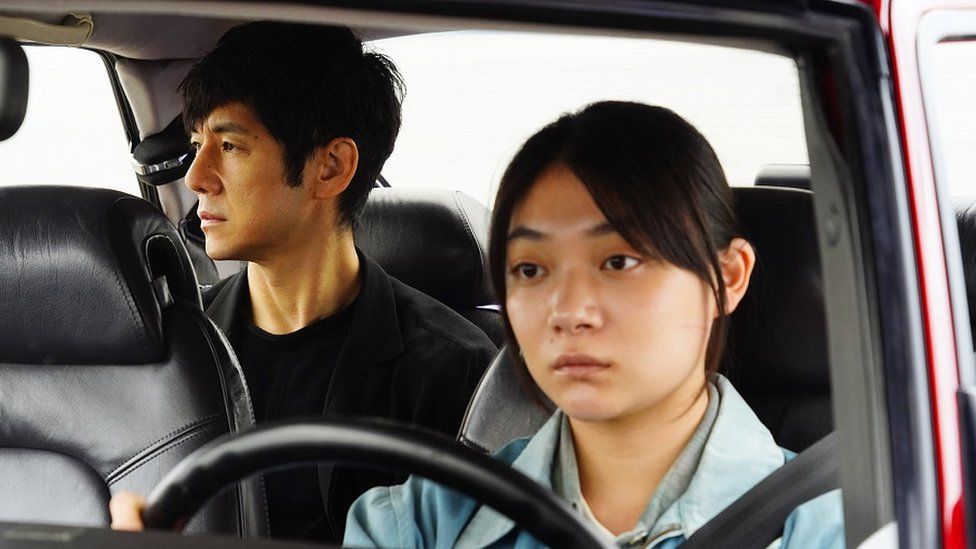 Image source, MODERN FILMS
Image source, MODERN FILMSWhile the recognition may be unexpected, Hamaguchi is keen to point out that the divide between so-called indie films and Hollywood-backed studio movies isn't always as big as we might think.
"I don't think there's a big gap between the two and even arthouse films are appealing to the masses. A lot of classic films have a higher level of art and I don't think there's a lot of difference between the two," he says.
It's certainly true that this isn't the first time in recent years that an arthouse film has gained the Academy's attention, with movies such as Moonlight picking up best picture in 2016 and South Korean hit Parasite triumphing in the same category three years later.
But Drive My Car is the first Japanese film to be nominated for an Oscar for best picture.
Love and loss
It follows the story of Yusuke Kafuku (Hidetoshi Nishijima) whose wife Oto (Reika Kirishima) dies suddenly. Two years later, he drives his beloved vintage Saab 900 to Hiroshima to direct a production of Chekov's Uncle Vanya.
There he forms an unlikely friendship with his young female chauffeur Misaki Watari (Toko Miura) who is employed to drive him back and forth from rehearsals.
Kafuku listens to tapes of his late wife reading lines from the play in the car, processing his grief as he gradually opens up to Misaki, who in turn becomes less reticent as the film progresses.
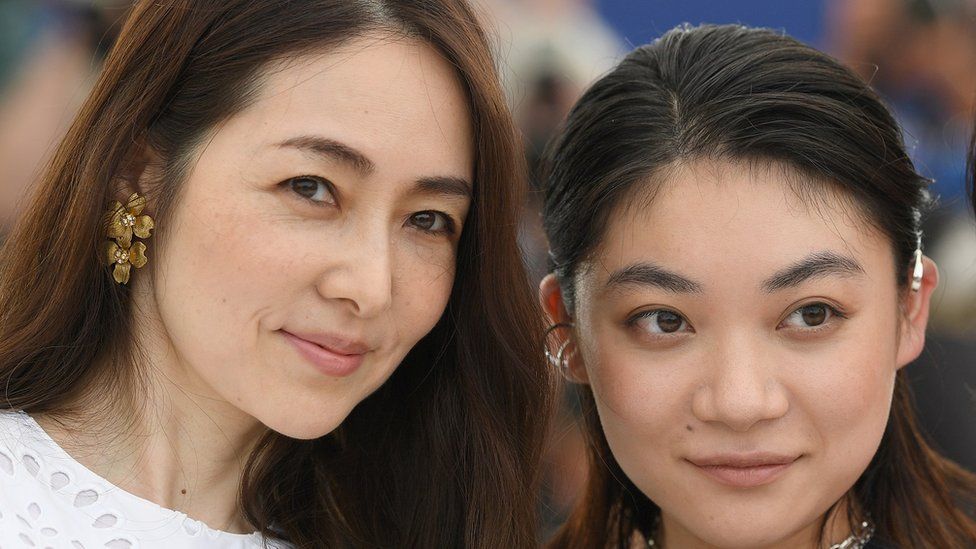 Image source, Getty Images
Image source, Getty ImagesAt three hours long - including a 40-minute prelude ahead of the opening credits - it's the longest film on this year's shortlist.
Some critics have pointed out that a little endurance may be required due to the running time. Writing in The Observer, Wendy Ibe notes "this is a supremely confident piece of film-making from Ryusuke Hamaguchi, albeit one that, at three hours long and with a rather Chekhov-heavy second half, will certainly require the right mindset".
But the overall consensus is that the film is richly rewarding, with a 98% positive rating on Rotten Tomatoes and the LA Times's Justin Chang calling the film "a haunting masterpiece".
Its length is in stark contrast to its source material, a sparse short story by renowned Japanese writer Haruki Murakami.
So how did Hamaguchi and co-writer Takamasa Oe go about expanding the tale?
"Creating the screenplay was challenging," he admits.
"The original story is only about 40 pages long but deep inside there's a huge narrative by the author. And to use a house analogy, we've tried to dig deep and find a house buried deep down - we thought it was a house but it was actually a massive divine palace that we found.
"So it developed and turned out to be huge," he explains. "I read this short story when it was published in a magazine and I liked it.
"I was attracted by the conversations in the car during which the two were getting closer and closer. There was a subtle expression about their relationship, and I have had that sort of experience myself in my own life. I started to feel I could relate to those two people within the novel and so I wanted to make it into a film," Hamaguchi says.
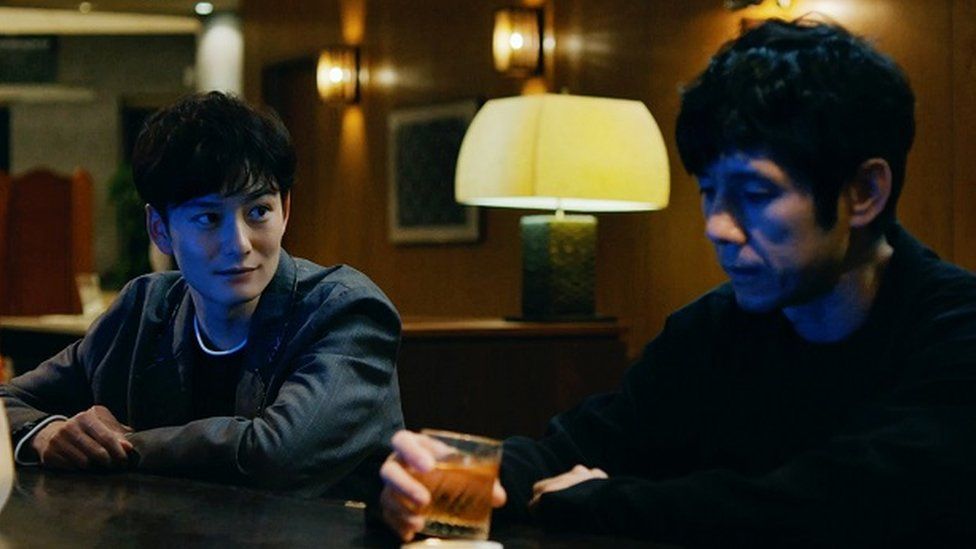 Image source, MODERN FILMS
Image source, MODERN FILMSI mention a recent article by a psychologist who suggested the best place to talk to uncommunicative teenagers was the car as it's an intimate setting but one where you don't have to make eye contact.
Hamaguchi agrees.
"The car is a space where you don't have to look at each other, and it's a situation when you can create a relationship that wouldn't be possible outside of the car. And you don't get to be judgemental about the other person within this kind of space.
"You can express your feelings and emotions in an honest way. You can be close to the other person and it can be intimate. And if you don't speak or express yourself, it could actually be awkward," he says.
While three-hour films are not unheard of - think Avengers: Endgame for starters - it can be off-putting for some cinema-goers or even those streaming from the comfort of their sofa.
But Hamaguchi says there was no pressure from the film company, Modern Films, to shorten it.
"It's not that I don't want it to be seen by anyone. On the contrary, I want as many people as possible to see this film. I wanted to make as short a film as possible! But when I created these characters… and when I was editing the film, I saw it needed this kind of expression.
"It was down to the producers to make the final decision and after editing, they watched the film and decided that this was the best version possible. So in a way they took the risk and I'm really grateful for that."
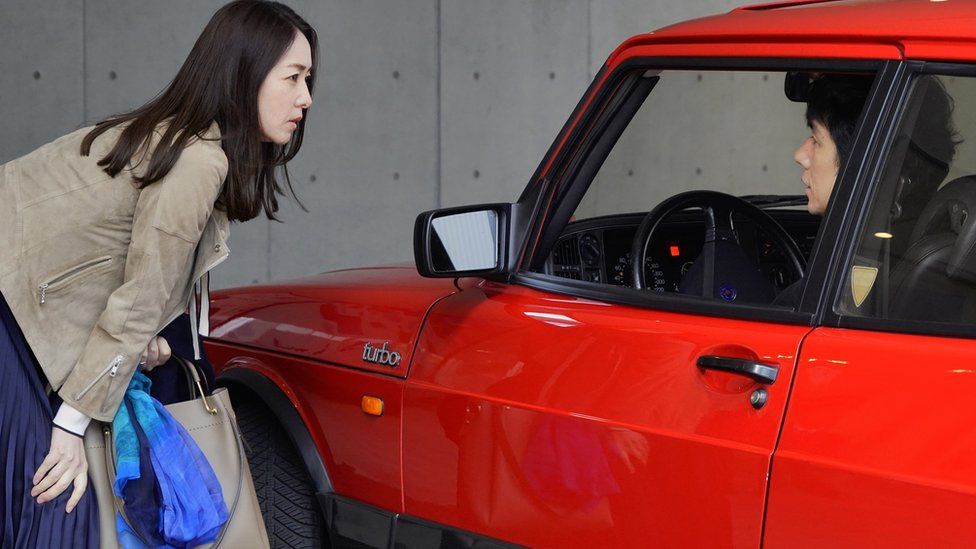 Image source, Getty Images
Image source, Getty ImagesThe film also features a sizeable ensemble cast, with Hamaguchi deliberately choosing a multilingual cast for the Uncle Vanya play which means the actors cannot understand what each other are saying and have to rely on other cues.
"We needed to encourage different interactions between different actors... it's all about interplay. You need to look and listen."
The cast includes Park Yoo-Rim, who plays a deaf actress in the film, using Korean sign language.
"I wanted to use sign language because I was invited to a film festival for deaf people and sign language was a common way of communicating between them. I felt I was a bit like a foreign person in there," Hamaguchi explains. "It's simply another language... that I found very beautiful."
It's not hard to see the parallels between Chekov's protagonist Ivan - a man who is re-evaluating his life - and Kafuku.
Chekhov is terrifying," Kafuku says in the script, because "when you say his lines, it drags out the real you."
I ask what makes the film resonate with so many film-goers. "People ask that question often," he replies, "but I can only say I don't know why. Because I'm the one to convey the message. And I'm not the one to receive it."
He politely throws it back to me: "Why do you think it is?"
I reply that perhaps it's because the journey of grief is such a universal one. And the grieving process cannot be rushed, which the film poignantly underlines.
"What you just said is about right and in essence, I think it all comes down to the universality of Murakami's narratives. These are people who lost something… you try to start your life again. And this kind of experience happens to everyone.
"You've got to love, to love others and at one time, you will lose them. And it's absolutely universal. It's a very strong message from Murakami. He depicts the narrative in great detail. And I wanted to do that in the film context and I think I was successful to a certain degree."



No comments